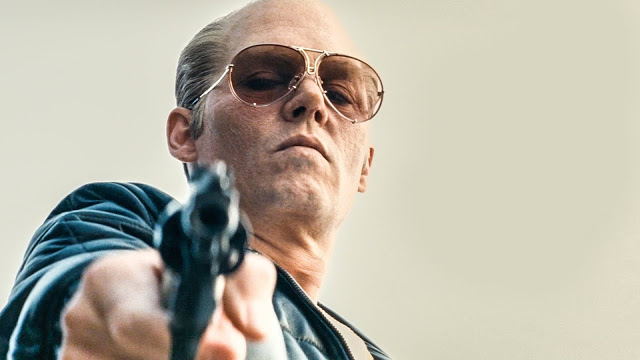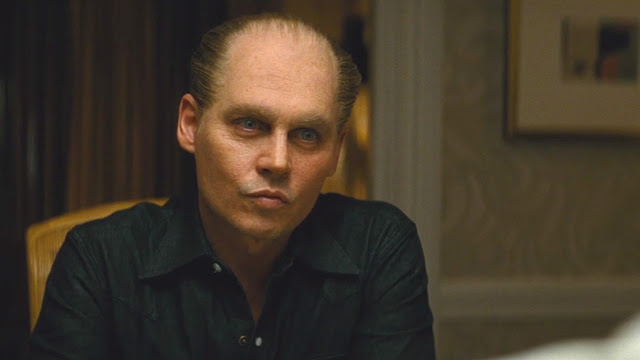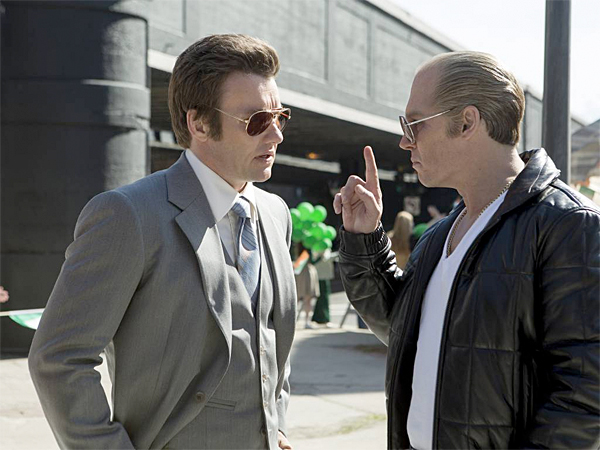James Whitey Bulger was one of the most notorious mobsters in United States history. What, don’t believe me? Just watch Black Mass, a movie that repeatedly and insistently trumpets Bulger’s legendary place in American gangster lore at every shrill turn. It features no shortage of people, whether harried law enforcement agents or cowed criminal cohorts, braying about Bulger’s illegal exploits and moral contemptibility. Yet the oddest thing about this adequately entertaining movie, which was directed in workmanlike fashion by Scott Cooper and features a dream-team cast, is that for all its vociferous proclamations, it reveals very little about who Bulger was, what he did, or how he eventually became one of the country’s most wanted fugitives. Yes, he kills a few people over the course of the film, and he threatens a few others, and he certainly seems very mean. But to the extent that he ruled Boston’s underworld for two decades as the leader of the Winter Hill Gang, well, you’ll just have to take Black Mass at its word. It presents a litany of testimony swearing to Bulger’s evil, but therein lies its flaw: It tells, but it does not show.
This does not mean that there is nothing to see. To begin with, there is the unforgettable sight of a blue-eyed Johnny Depp. Those eerie cerulean irises (the product of contact lenses), along with slicked-back pale-blond hair and prosthetically rotted teeth, combine to give 2009’s sexiest man alive a truly frightening countenance. And while one might quibble with the subtlety of Depp’s performance as Bulger—which is to say, there is none—it is impossible to deny the ferocious commitment he brings to the role. Often the target of critical ridicule for his unfettered flamboyance (which can, of course, yield spectacular results), he is all business here, those unblinking, alien blues teaming with a snarling Beantown monotone that befits Bulger’s blunt, monolithic persona. He rarely raises his voice, but he is always threatening, whether he’s coolly berating an underling or, in the film’s most quietly terrifying scene, exerting his will over a colleague’s wife. He is not someone you wish to cross.
Crossing Bulger is exactly what several characters do in Black Mass, which delivers exposition via an ungainly framing device, in which a DEA agent named Olsen (Lonnie Farmer) interviews the crime lord’s confederates-turned-informants. These scenes, in which the camera alternates between static close-ups of Olsen and his various subjects, conform to a frustratingly rigid blueprint: Olsen asks a direct question about Bulger (“Was Whitey in Florida that day?” “Who was with him?”), and the informer provides a one-word answer (“Yes.” “John.”). Cut to the event in question, return to the interview room, repeat. As far as expository devices go, this one is admittedly more visual than the typical voiceover, but it’s still hopelessly inert, and it sucks all of the energy right out of the theater. Condensing 20 years of Bulger’s misdeeds into a feature film was undoubtedly challenging (screenwriters Mark Mallouk and Jez Butterworth have attempted to adapt a book by Dick Lehr and Gerard O’Neill), but the interrogation gimmick only underscores that difficulty.
It also exposes Cooper’s limitations as a storyteller. This is his third effort, and if nothing else, it affirms his ability to elicit quality work from high-profile actors (Jeff Bridges won the Oscar for Crazy Heart, while Christian Bale’s unappreciated, soulful performance was by far the best thing about the overheated Out of the Furnace). But he also appears prone to trying to emulate classic American movies, with predictably inferior results. Where Out of the Furnace felt like a macho knockoff of The Deer Hunter, his obvious aspiration here is The Departed, which featured Jack Nicholson munching scenery as a Bulger-like Boston boss. It is perhaps unfair to measure Cooper against Martin Scorsese, but he practically invites the comparison, even going so far as to have Bulger darkly scold someone for revealing a secret recipe, a macabre moment that’s ripped right from Joe Pesci’s “Funny how?” tirade in Goodfellas.
Speaking of recipes, Black Mass suggests that Cooper is following a formula for how to make a mob movie but that he misplaced the most important ingredient: flair. Gangster films are designed to be indecently enjoyable, to seduce us with visions of wealth and power and men unconstrained by society’s nettlesome rules. Yet even ignoring Cooper’s ill-advised attempts at imitation, long stretches of Black Mass feel disappointingly stiff and lethargic. With the exception of a slow tracking shot down a narrow hallway that foreshadows a gruesome execution, there are no memorable set pieces. Many scenes sputter predictably, and the frequent spasms of violence are presented almost dutifully, resulting in neither excitement nor provocation; when someone gets shot in the head (this happens quite often), Bulger orders someone else to dig a hole and dump the body, and the movie just moves on. (That could be construed as admirably frank, if Cooper weren’t so clearly trying to scandalize you.) Cooper is still good with actors, but despite Depp’s glowering magnetism, few of the genre thrills here are really thrilling.
What partially redeems Black Mass—apart from its ridiculously deep cast, which includes Peter Sarsgaard as a squirrely informant; Jesse Plemons as a rugged enforcer; Kevin Bacon, Adam Scott, and David Harbour as agents with uncertain loyalties; Dakota Johnson, Julianne Nicholson, and Juno Temple as petrified women who seek to evade Bulger’s wrath; and the great Benedict Cumberbatch as Billy, a Massachusetts senator who also happens to be Bulger’s brother—is its insightful exploration of Bulger’s mysterious relationship with the FBI, for whom he served as an informant. (In the film, Bulger insists that he isn’t a rat but is instead forming “an alliance”.) That’s why the most important character in Black Mass isn’t Bulger at all; it’s John Connolly, a Boston-bred fed who serves as Bulger’s handler for the bureau and who is played, in a fantastically nuanced performance, by the rapidly ascending Joel Edgerton (Warrior, The Gift). Connolly is the ambitious type, and he’s been tasked with dismantling the Angiulo Brothers, a mafia outfit operating out of Boston’s North End. But the Angiulos are slippery, and the FBI is having little luck bringing them to justice. What the bureau really needs, Connolly insists to his bosses, is a source within the criminal element to provide precious information. Someone like, you know, Whitey Bulger.
This may seem like inspired police work, and Bulger does indeed deliver intelligence that leads to the Angiulos’ arrest. But as Black Mass progresses, it becomes clear that something far more insidious and disturbing is at work. Connolly, who grew up with Bulger, is in the gangster’s thrall. He believes that he shares with Bulger an unbreakable bond, one forged in the cold New England winters, and he considers himself to be not just Bulger’s liaison, but also his equal and his friend. Bulger, of course, is none of those things, not to Connolly nor to anyone else; he is simply a virus, feeding off the nearest host in his unquenchable lust for power. Yet Connolly, as articulated by Edgerton with heartbreaking clarity, remains steadfast in his support of Bulger, confusing his own weakness for devotion. And for all of Black Mass‘s faults—its failure to properly excavate Bulger’s criminal empire, its bevy of thinly developed subplots (at one point, Bulger happily provides arms to the IRA, and wait, is he seriously involved with jai alai?), its general limpness—it works surprisingly well as a tragedy.
But not well enough. The sense of sadness that accompanies Connolly’s downfall is forcible, but it by no means offsets the perplexing blankness that engulfs most of the movie. We learn little watching Black Mass beyond what we already knew, namely that talented and dedicated actors can help elevate the mundane material that surrounds them. At one point, attempting to throw his bosses off the scent, Connolly whimpers, “What’s Bulger done?” We’re intended to interpret the question as inadvertently rhetorical; that’s certainly the reaction of a federal prosecutor (Corey Stoll, characteristically good), who responds with a “Surely you can’t be serious?” level of incredulity. The problem with Black Mass is that, after its ephemeral pleasures have subsided, Connolly’s question lingers unanswered. It’s a hole that no dead body could ever fill.
Jeremy Beck is the editor-in-chief of MovieManifesto. He watches more movies and television than he probably should.



